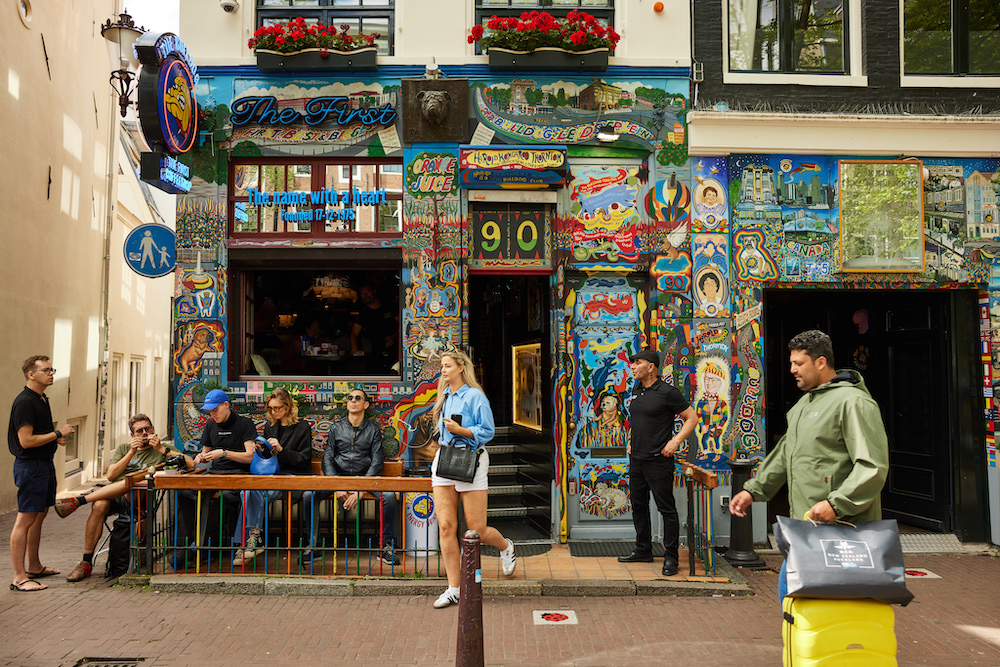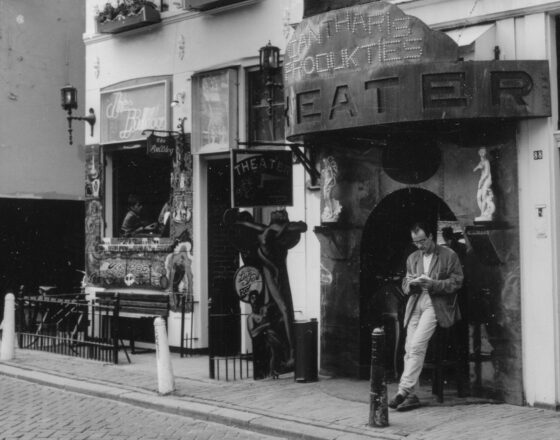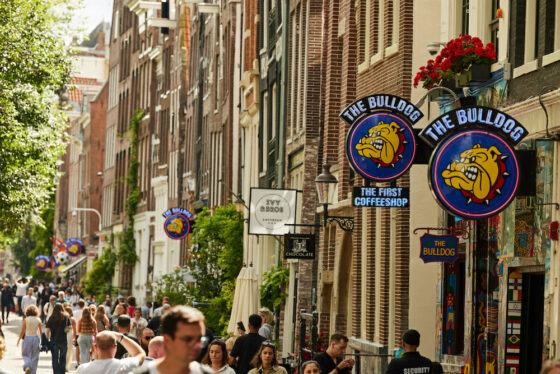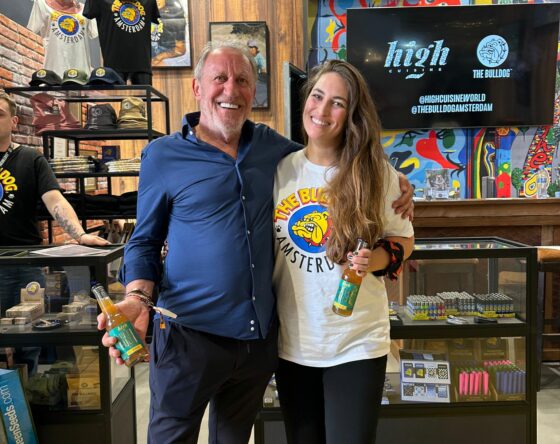Bulldog dynasty: Amsterdam coffeeshop chain returns to its roots
Louis Gore Langton
The Bulldog coffeeshop is perhaps the most iconic and commercial of all of Amsterdam’s cannabis businesses. In the build up to the chain’s 50th anniversary next December, Chantal de Vries – the daughter of the Bulldog’s founder, Henk de Vries – is seeking to revive the coffeeshop’s roots.
Chantal, who is 33 years old, heads the company’s marketing and communication department. Now, she and other members of the family want to reestablish and rebuild the legacy by doing two (potentially opposing) things.
On the one hand the aim is to bring back to life what she says is their authentic status as “the living room of Amsterdam”. And on the other, it is to continue the growth toward becoming a global Hard Rock Cafe-style chain of cannabis outlets, hotels, restaurants, bars and clothing stores.
Red light district roots
Sitting in the Bulldog’s head office in central Amsterdam, Chantal is at a boardroom table surrounded by brand merchandise and a large world map behind her.
She says that in order to understand what the Bulldog is, what it has become and how it lost its path over the past several decades, we need to go back to its beginnings in the early 1970s. Her father Henk grew up in the streets of the city’s red light district, which at the time was an impoverished and crime-ridden district where unregulated prostitution and “hard” drug use was booming. Henk’s father ran a pornography shop on the canalside.
In 1970 the Holland Pop Festival was held in Kralingse Bos near Rotterdam. It was meant to mirror the US Woodstock festival held the year before, and bring the festival’s counterculture to the Netherlands.
Henk, who was 19 years old at the time, went there and began handing out cannabis to people for free. Once he realised he’d run out, Chantal says, he started looking for some more and came across people selling it. Then he realised what they were selling was what he’d just given away, and saw a business opportunity.

He returned to Amsterdam immediately, went straight to the Cotton Club (one the city’s oldest jazz bars) where he got hold of kilo of weed and hash, and then went directly back to the festival, laid out a blanket and began selling. The police famously decided to turn a blind eye to weed smoking at the festival, marking the beginning of the country’s gedoogbeleid (tolerance policy).
The living room and the Salvation Army
Henk began selling regularly, but was imprisoned in Germany not long after for trafficking cannabis across the border, and spent around two years in jail. This is not a period of his life he likes discussing, Chantal says, but when he returned to the Netherlands in 1974 he found a changed city. The heroin epidemic had hit, and many of his friends and family members were hooked.
Henk inherited his father’s porn store in the red light district. But that business had become harder and more sordid as well. In 1975, he turned the shop into a lounge where people would be able to smoke pot and relax away from all the turmoil going on in the streets.
“He wanted a safe place where people could drink coffee, smoke weed, play games and talk. Keeping them away from heroin. This was why we were originally called ‘the living room of Amsterdam’” Chantal says. At the same time, Henk started working with the Salvation Army to provide help to local women in the red light district and addicts around Amsterdam.
He did this, she says, because as a child he’d been taken in by Majoor Bossard, who pioneered the work of the Salvation Army in Holland after World War II. She kept him away from the streets and helped him get an education, and he’d promised that the moment he started making money, he’d provide for her and give back to the organisation.
Today, an official Bulldog foundation gives substantial amounts of money to the Salvation Army every year. Chantal has been actively involved for the past eight years, she says. “This Tuesday I’ll be doing our monthly volunteering night, cooking for local women that have been abused or are addicted. Every Christmas we have a big charity evening for at least 700 people, where we feed everyone and give out clothes and money.”

Growing up with a father like Henk, she says, was different because he travelled a lot and was busy with the company most of the time. “But when we spent time together, he focused on me completely.”
“Even though he achieved so much with the company, he has always stayed true to himself,” she says. “Where other big or famous people would start bragging about their company or start showing off with their clothes, Henk was still using the same coat and fanny pack as he had done for many years. I am happy he is like that and it has formed me in the same way.”
Business and legal
The company is preparing to begin celebration events and products for its 50th anniversary beginning in January, and is designing a range of limited edition products. The family is also collaborating with other businesses like clothing brand The Fast Die Young.
“We’re looking to start producing better quality products of all types rather than cheaper souvenir style products,” says Chantal. “The prices will go up with the quality. We want to be seen as a brand in every aspect.”
The Bulldog’s commercial interests have caused it trouble in the past. In 2022, it won a nine year legal battle against Red Bull, which accused it of trademark infringement over energy drink sales.
“We want to be known for all of our business, not just the weed, including the hospitality industrry we want people to talk about how good our restaurants, hotels and clothes are,” Chantal continues.
Grey area
Of course, the source of the Bulldog’s early income, based as it was on cannabis, remains a grey area. Coffeeshops were ignored and then licenced, and now experiments are underway to set up regulated production.
Amsterdam is not part of the experiment but Chantal hopes that eventually the company’s smoking segment will benefit along with the rest of the industry.
In the meantime, the chain has become synonymous with Amsterdam’s most touristy and commercial elements – something many Amsterdammers, including the mayor, want to scale back.
Chantal says the way the business changed from its beginnings as a local lounge to an international attraction over several decades wasn’t clear to them until the Covid pandemic hit.

“The local customers stopped coming, which we didn’t expect. This was a big eye opener. We were just growing so rapidly, and then we suddenly realised we’d lost the soul of the company. We were drowning in success. We’d lost focus and our strategy wasn’t clear anymore. We were making so much money that we weren’t even sure of our purpose.”
“We had to start making changes. We altered the events to make sure locals felt welcome, we made some changes to the products, and this had a positive impact,” she says.
The chain now has 14 locations in the Netherlands, as well as hotels and shops in Spain, Italy, Canada and previously Aruba (where they’re planning to rebuild). Chantal says the family looks to Hard Rock Cafe as a big inspiration for the Bulldog’s next 50 years, but says they’ll also not forget the mistakes that were made, and that the solutions will always lie in the family’s origins.
“The company is family owned, many of us work in it and our feelings are planted in its roots,” she says. “It’s strong because of our family collaboration, and as long as everybody is involved it will stay that way.”
Thank you for donating to DutchNews.nl.
We could not provide the Dutch News service, and keep it free of charge, without the generous support of our readers. Your donations allow us to report on issues you tell us matter, and provide you with a summary of the most important Dutch news each day.
Make a donation